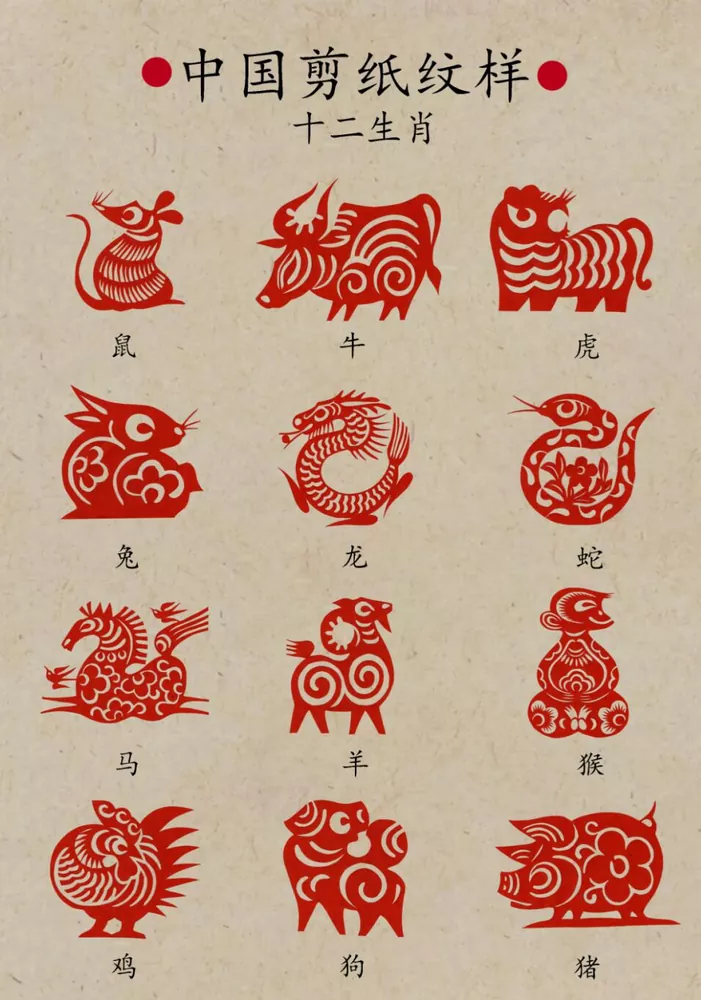The Twelve Chinese Zodiac Animals
The Twelve Chinese Zodiac Animals, also known as Birth Animals or 12 Symbolic Animals, are an integral part of Chinese culture. These twelve animals, which are paired with the twelve earthly branches to designate years, represent a unique system of symbolism and folk beliefs. Below is an introduction to each of the zodiac animals, along with their respective characteristics and some related English expressions.
The twelve zodiac animals, also known as the Sheng Xiao in Chinese culture, hold a profound and unique significance in the lives of Chinese people. This ancient system, which assigns a specific animal to each birth year, reflects a deep-seated cultural and philosophical understanding of life, nature, and society.

Symbolic Representation
Each of the twelve zodiac animals carries its own unique symbolism and meaning. For instance, the Rat (Zi) symbolizes ingenuity, agility, and resourcefulness, while the Ox (Chou) represents diligence, patience, and strength. The Tiger (Yin), on the other hand, embodies courage, bravery, and leadership. These symbolic attributes are often associated with the personality traits and destiny of individuals born under each respective zodiac sign.
Cultural Influence
The twelve zodiac animals are an integral part of Chinese folklore and traditional customs. They are widely used in various cultural contexts, including festivals, celebrations, and even personal naming conventions. During the Chinese New Year, for example, people often decorate their homes with images of the zodiac animal corresponding to the incoming year, believing it brings good luck and prosperity.
Personal Identity and Compatibility
In Chinese culture, the zodiac sign is often considered an important aspect of personal identity. Many Chinese people believe that their zodiac sign influences their personality, strengths, and weaknesses. Furthermore, the compatibility between different zodiac signs is also taken into account in various aspects of life, such as marriage and business partnerships. The concept of "sheng xiao hé" (zodiac compatibility) is widely used to predict the harmony or conflict between individuals based on their zodiac signs.
Philosophical Insights
The twelve zodiac animals are also deeply connected to Chinese philosophy and cosmology. They are believed to represent different aspects of the universe and to reflect the interconnectedness of all things. By understanding the symbolism and meaning of each zodiac animal, Chinese people gain insights into the natural world and their place within it.
In summary, the twelve zodiac animals play a significant role in the lives of Chinese people, reflecting their cultural heritage, personal identity, and philosophical understanding of the world.
The Twelve Zodiac Animals
-
Rat (Rat)
- Characteristics: Inventive, dexterous, and quick-witted.
- Legend: According to legend, the Rat secured the first position in the zodiac by being the first to arrive at the Jade Emperor's banquet.
- English Expressions: A speck of mouse dung will spoil a whole pot of porridge (One bad apple spoils the barrel).
-
Ox (Ox)
- Characteristics: Dependable, patient, and a symbol of agriculture and hard work.
- Legend: The Ox was chosen as one of the zodiac animals for its diligence and resilience.
- English Expressions: The cowhide is not blow, the train is not pushed (Actions speak louder than words).
-
Tiger (Tiger)
- Characteristics: Confident, a natural leader, and seen as a symbol of bravery and strength.
- Legend: The Tiger earned its place in the zodiac for its majestic and adventurous nature.
- English Expressions: Newborn calves are not afraid of tigers (Youth is bold).
-
Rabbit (Hare/Rabbit)
- Characteristics: Sociable, sentimental, gentle, and kind.
- Legend: The Rabbit was chosen as a zodiac animal for bringing delicious food to the Jade Emperor's banquet.
- English Expressions: A rabbit is never caught twice in the same place (Once bitten, twice shy).
-
Dragon (Loong/Dragon)
- Characteristics: Energetic, bossy, and a symbol of power and auspiciousness in Chinese culture.
- Legend: The Dragon, being a mythical creature, represents the highest status among the zodiac animals.
- English Expressions: Even a dragon finds it hard to control a snake in its old haunt (Even the strongest has weaknesses).
-
Snake (Snake)
- Characteristics: Deep thinkers, critical, charming, and associated with wisdom and cunning.
- Legend: The Snake earned its place in the zodiac for its ability to adapt and solve problems.
- English Expressions: A snake in the grass (A hidden enemy or danger).
-
Horse (Horse)
- Characteristics: Hard-working, headstrong, and a symbol of speed and vitality.
- Legend: The Horse secured its place in the zodiac for its swift performance in the race of the zodiac animals.
- English Expressions: Get on the high horse (Become arrogant or overbearing).
-
Goat/Sheep (Goat/Sheep)
- Characteristics: Warm-hearted, talented, gentle, charitable, and creative.
- Legend: The Goat/Sheep was chosen as a zodiac animal for its contributions to humanity.
- English Expressions: He that makes himself a sheep shall be eaten by the wolf (Weakness invites exploitation).
-
Monkey (Monkey)
- Characteristics: Thinkers, innovative, intelligent, lively, and witty.
- Legend: The Monkey secured its place in the zodiac for its clever performance in the race of the zodiac animals.
- English Expressions: There are no tigers in the mountains, monkeys are called kings (In the absence of stronger ones, the weaker ones take charge).
-
Cock/Rooster (Cock)
- Characteristics: Often associated with leadership and confidence.
- Note: Not traditionally one of the twelve zodiac animals in the standard list, but sometimes mentioned.
- English Expressions: Cock of the walk/school (The leader or dominant figure).
-
Dog (Dog)
- Characteristics: Loyal, sometimes used metaphorically for a variety of people (e.g., a lucky dog, a sly dog).
- Legend: Dogs are an important part of Chinese culture, often symbolizing loyalty and protection.
- English Expressions: Barking dogs seldom bite (Don't be fooled by appearances).
-
Boar/Pig (Boar/Pig)
- Characteristics: Often depicted as joyful and easygoing.
- Note: In some English translations, "Pig" is used instead of "Boar" to represent this zodiac animal.
- Legend: The Boar/Pig represents abundance and fertility.
- English Expressions: None specifically related to the zodiac animal, but pigs are often associated with laziness or gluttony in English idiomatic expressions.
Glossary
| Chinese | English |
|---|---|
| 十二生肖 | The Twelve Chinese Zodiac Animals |
| 鼠 | Rat |
| 牛 | Ox |
| 虎 | Tiger |
| 兔 | Hare/Rabbit |
| 龙 | Loong/Dragon |
| 蛇 | Snake |
| 马 | Horse |
| 羊 | Goat/Sheep |
| 猴 | Monkey |
| 鸡 | Cock/Rooster |
| 狗 | Dog |
| 猪 | Boar/Pig |








